![]()
William Hazlitt
William Hazlitt's Hamlet was also torn with inner conflict
and indecision. The events on stage become an external manifestation of an
inner battle.
| He seems incapable of deliberate action, and is only hurried into
extremities on the supr of the occasion, when he has no time to reflect,
as in the scene where he kills Polonius, and again, where he alters
the letters which Rosencrans and Guildenstern are taking with them to
England, purporting his death. At other times, when he is most bound
to act, he remains puzzled, undecided, and sceptical, dallies with his
purposes, till the occasion is lost, and finds out some pretence to
relapse into indolence and thoughtfulness again. For this reason he
refuses to kill the King when he is at his prayers, and by a refinement
in malice, which is in truth only an excuse for his own want of resolution,
defers his revenge to a more total opportunity, when he shall be engaged
in some act 'that has no relish of salvation in it.' He is the prince of philosophical speculators: and because he cannot have his revenge perfect, according to the most refined idea his wish can form, he declines it altogether. - William Hazlitt, Characters of Shakespear's Plays, (1817 Complete Works, Dent and Sons, London, 1930. v.4. p.234. |
 |